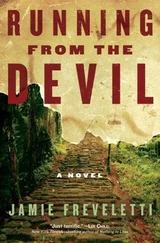The Devil that Danced on the Water
A Daughter’s Memoir of Her Father, Her Family, Her Country and a Continent
Aminatta Forna

For My Father
Honour and shame from no condition rise;
Act well your part: there all the honour lies.
From An Essay on Man , Alexander Pope (1733)
Cover Page
Title Page The Devil that Danced on the Water A Daughter’s Memoir of Her Father, Her Family, Her Country and a Continent Aminatta Forna
Epigraph Honour and shame from no condition rise; Act well your part: there all the honour lies. From An Essay on Man , Alexander Pope (1733)
Book One Book One
1
2
3
4
5
6
7
8
9
10
11
12
13
14
15
16
17
18
19
20
21
22
23
24
25
26
27
28
29
30
31
32
33
34
35
Book Two
36
37
38
39
40
41
42
43
44
45
46
47
48
49
50
Acknowledgements
About the Author
Praise
Copyright
About the Publisher
Book One
In the early morning he stands in the doorway of his hut and listens for the distant rumble. The cool air bears the earthy scent of promised rain. From the veranda above I can see the plume of red dust rising in the lorry’s wake long before the man with the pickaxe who waits below me hears the engine. I am ten years old. It is 30 July 1974. I am watching a dust devil heading for my home. It writhes as it chases the driver around the rocky lanes, towering above the truck, forcing the vehicle away from the main routes, past the tumble of houses towards the edge of the precipice where we live. Now I can hear its roar begin; at first low and deep it rises to a shrieking cacophony. And suddenly, silence. The driver swings out of the cab down below. Behind him the devil slumps to the ground and waits.
I watch the driver speak briefly to the waiting man, who nods in return. The driver climbs back into his cab. The man with the pickaxe moves to within a few feet of his hut and gestures with his right hand. The driver manoeuvres his vehicle forward and back, until it is almost up against the shack. The massive hulk of the truck might easily crush the flimsy panbody of rusting corrugated iron, wooden slats and cardboard. The roof is held down with old tyres. Twelve people live in there, my stepmother tells me. I wonder if they are inside now, while all this is going on. Finally the driver pushes a lever and the load of rocks slides to the ground, freeing a mighty dust devil which spins up above the heads of all of us: the mother devil.
When the truck is gone the man and I contemplate the mountain of rocks. He leans over and picks one up. In his hand it is about the size of a melon; the surface is pitted and full of holes and it looks like a red moon rock. He positions it with care upon the edge of a boulder protruding from the ground. Then he lifts his iron-handled pick and, with the practised grace of a tennis player about to serve an ace, he swings the tool in an arc up behind his back, over his shoulder and down, lunging at the heart of the rock. It shatters, pleasingly, into half a dozen pieces. He glances briefly up at me and nods; I wave back a small acknowledgement. Then he selects another rock and repeats the same, perfect action.
The plateau where he stands is just at the point where the level ground gives way to the steep sides of the valley. There are no more houses, just a dense, green mat of tangled vegetation crossed with narrow paths of bare, red earth leading to and from the stream on the valley bed. I am forbidden by my father to go anywhere near the water. Farther up the valley a slaughterhouse built directly above the narrow channel pours effluent directly into it. The slaughterhouse attracts vultures, who wait out the time between meals on the roof of our house. I often do go down to the stream alone because I can’t equate the joys of playing with the glittering, cool water with the invisible danger. Neither can the family in the panbody , who carry water from the stream to wash their pots and cook their rice.
On the opposite side of the stream, halfway up the valley, stands a wooden shed. Empty by day, it serves as an illicit drinking den at night where men and women from the low-cost houses gather and drink omole , a twice-distilled palm wine so strong, I’d been told, that it could rob a man of his sight. The fermented liquid had to be strained of dead flies and live maggots before it was considered fit to drink. On the weekends the drinkers become revellers and turn up the music until it reverberates across the slopes and drowns the night-time sounds. Every Friday night the clamour of the frog colonies at the water’s edge, the nocturnal serenades of stray dogs and the constant clatter of the crickets give way to the rhythms of Carl Douglas singing, ‘Everybody Was Kung Fu Fighting’ again and again, until the early hours of the morning.
In our house, we love it. We learn the words and improvise dance routines. My cousin Morlai scrunches his eyes into oriental slits, spins on his heels, kicks and punches the air. He is in his twenties and wears a slim-fit, patterned purple nylon shirt and matching flares with patch pockets. The girls Esther and Musu, also our cousins, laugh as though they are fit to burst. Afterwards Morlai and Santigi (who is not our cousin but lives with us all the same) leave to go out on the town. As they depart we tease them from the same veranda I watch from now. They take turns at wearing a pair of cheap sunglasses and disappear from view enfolded into the unblemished blackness of the night. In the morning there will be stories of bars and bravado.
Against the metronome of cracking rocks I can hear car horns and the poda podas on Kissy Bye-Pass Road revving their engines as they prepare to take the workers into the city. High above the motors come the sing-song sopranos of the boys who lean out of the back door to call the routes: ‘Kiss-ssy, mountain cut, savage street, motor ro’ad.’ I can imagine the people pressing forward, cramming their bodies into every available space on board, the fetid odour, the heat. The latecomers climb onto the roof, or hang on the back step.
Poda poda : ‘hither and thither’ the words mean. Rival teams of minibuses, covered in painted slogans and boasting the names of their owners, flying through town all day long. From here they weave their way through the tight alleys of the East End into the downtown area, where the office workers drop down and disappear into a grid of low-rise office blocks and old colonial government buildings. Some buses go up Circular Road and past the cemetery, beyond whose walls thick tropical climbers coil round the gothic gravestones as though they’d like to drag them back into the very graves they mark.
Other poda podas inch their way around the massive trunk and soaring branches of the Cotton Tree, which appears on postcards and in calendars as the symbol of Freetown, home of the freed slaves, once but no more the Athens of Africa. The words are always written with capitals: the Cotton Tree. In between the massive roots the lepers sleep on, undisturbed under their makeshift awnings. The poda podas start up Independence Avenue but turn off halfway up, before they reach State House, where the president rests in air-conditioned rooms; across to Pademba Road they go and past the prison. At Savage Street the schoolchildren jump down and separate into shoals: royal blue follows royal blue, brown checks group together, green blazers and boaters drift into one.
Читать дальше













